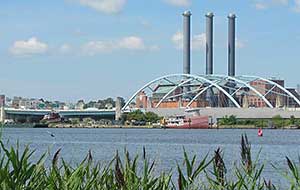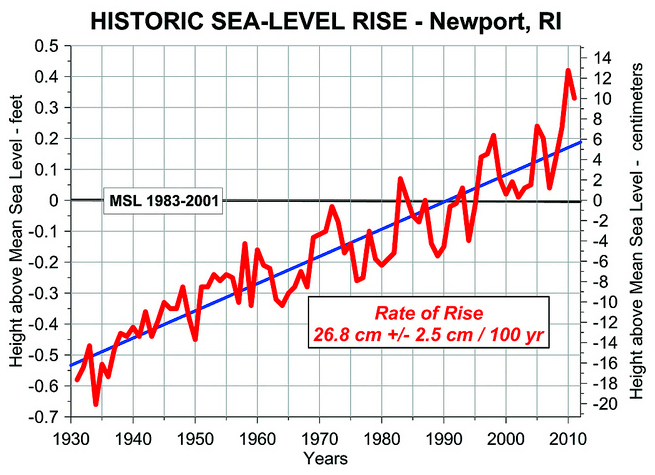
Photo Credit: Rhode Island Sea Grant
Manufacturing, Industry and Marine Trades
Samuel Slater began the country’s Industrial Revolution in the late 18th century in Rhode Island, making manufacturing and production of consumer products a backbone of the state’s economy. Marine trades in The Ocean State have always enjoyed a strong presence, serving commercial and recreational water-dependent industries through such work as shipbuilding, designing America’s Cup yachts, sail making and service provisions of all types. These businesses also stimulate the economy’s “multiplier effect,” which is all the money spent by those earning a living in marine trades or the tourists who enjoy them. Think payroll taxes to restaurants and hotels.

The power plant next to the Port of Providence
Even though the service industry is now dominant in Rhode Island, there is still a place for manufacturing and marine trades of all sorts. The continued viability of these industries depend heavily upon coastal-linked resources, which are seeing new opportunities for the use of “short-sea” shipping, an increasing variety of uses of the state’s major ports for water transport, and a still-expanding marina industry.
However the state’s reliance on Narragansett Bay and ocean waters also means that the coast-related impacts of climate change will be most heavily felt by these businesses. Sea level rise and increased intensity of storms and hurricanes are very real and present dangers to the economic success or failure of these industries.
Below is a more detailed look at the future impacts of climate change for these vital components of the Rhode Island economy. Some pressures are already being felt and adapted to by certain businesses, while other industries are waiting for the other shoe to fall before taking adaptive actions.
Manufacturing Impacts (Adobe Acrobat)
Impacts on Consumer Manufacturing (Adobe Acrobat)
Economic Impacts on Marine Trades (Adobe Acrobat)
“Manufacturing takes place in very large facilities. If you want to build a computer chip, you need a giant semiconductor fabrication facility. But nature can grow complex molecular machines using nothing more than a plant.”
- Ralph Merkle
News
“Tourists Are Flocking to Locations Threatened by Climate Change. That Only Makes Things Worse.” Vox
Factoids
One in four businesses forced to close because of a natural disaster never re-open.
Weather- and climate-related insurance losses today average $50 billion a year. These losses have more than doubled each decade since the 1980s, adjusting for inflation.
Many businesses in a variety of different sectors are already proactively planning for climate change in order to have a strategic advantage over other companies once impacts become more severe and frequent.





